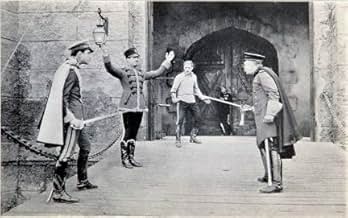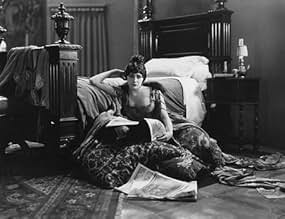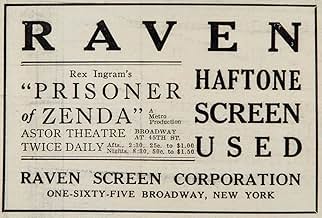Aggiungi una trama nella tua linguaWhen the king is drugged and abducted by his ambitious brother, a lookalike relative must take his place to keep the evil sibling off the throne.When the king is drugged and abducted by his ambitious brother, a lookalike relative must take his place to keep the evil sibling off the throne.When the king is drugged and abducted by his ambitious brother, a lookalike relative must take his place to keep the evil sibling off the throne.
- Regia
- Sceneggiatura
- Star
- Premi
- 1 vittoria in totale
Ramon Novarro
- Rupert of Hentzau
- (as Ramon Samaniegos)
Fairfax Burger
- Bersonin
- (as Fairfax Burgher)
S.E. Jennings
- De Gautet
- (as Al Jennings)
Ted Billings
- Train Passenger Eating Banana
- (non citato nei titoli originali)
Carrie Daumery
- Lady-in-Waiting
- (non citato nei titoli originali)
Bynunsky Hyman
- Coronation Parade Spectator
- (non citato nei titoli originali)
Eric Mayne
- Lord Burlesdon - Rudolf's Brother
- (non citato nei titoli originali)
Lon Poff
- Archbishop
- (non citato nei titoli originali)
Recensioni in evidenza
A retiring English country gentleman, Rassendyll, is mistaken for his distant cousin, King Rudolph of Ruritania. When the king is taken hostage by his jealous brother, Black Michael, Rassendyll agrees to act as the king in the coronation ceremony.
It takes a long time for this version of 'The Prisoner of Zenda' to get moving. The first hour or so is stodgy and less than riveting film-making, and then it gradually picks up momentum, and the last half hour packs a decent punch, especially action-wise. But all in all, a rather more lackluster, even crude entertainment than I had expected after the exhilarating 'Four Horsemen of the Apocalypse', also by Rex Ingram.
The script is largely at fault, with the scenes so disjointedly put together that it does not in long stretches make a lot of sense. It has the makings of some interesting psychological insights, but does not explore them. I would have made more - MUCH more - out of the fact that for a long while Black Michael seems a pretty decent fellow, genuinely in love with Antoinette and understandably preoccupied about leaving the fate of his country to his feeble-minded brother. But Ingram makes nothing of it and seems curiously uninspired.
The youngish Lewis Stone is an earnest Rassendyll/Rudolph, and sort of holds his own in the climactic sword-fight with, among others, Ramon Novarro. And now we are getting somewhere. This is Novarro's film. He was hardly a star when it was made, and his role does not take up a lot of screen time, but Novarro eats up the scenery with his monocled, slick diabolism. "While you're unhung, Rentzau, hell lacks its master!", Stone says, and right he is. Novarro is pure evil, and a delight to watch.
It takes a long time for this version of 'The Prisoner of Zenda' to get moving. The first hour or so is stodgy and less than riveting film-making, and then it gradually picks up momentum, and the last half hour packs a decent punch, especially action-wise. But all in all, a rather more lackluster, even crude entertainment than I had expected after the exhilarating 'Four Horsemen of the Apocalypse', also by Rex Ingram.
The script is largely at fault, with the scenes so disjointedly put together that it does not in long stretches make a lot of sense. It has the makings of some interesting psychological insights, but does not explore them. I would have made more - MUCH more - out of the fact that for a long while Black Michael seems a pretty decent fellow, genuinely in love with Antoinette and understandably preoccupied about leaving the fate of his country to his feeble-minded brother. But Ingram makes nothing of it and seems curiously uninspired.
The youngish Lewis Stone is an earnest Rassendyll/Rudolph, and sort of holds his own in the climactic sword-fight with, among others, Ramon Novarro. And now we are getting somewhere. This is Novarro's film. He was hardly a star when it was made, and his role does not take up a lot of screen time, but Novarro eats up the scenery with his monocled, slick diabolism. "While you're unhung, Rentzau, hell lacks its master!", Stone says, and right he is. Novarro is pure evil, and a delight to watch.
I've seen both Rex Ingram's "Scaramouche" and "The Prisoner of Zenda" and by far "Scaramouche" the more entertaining film. This film though, was very fascinating. Lewis Stone acquits himself well as the hero/drukand king and swordfights quite well. Alice Terry made a very beautiful princess. Ramon Novarro played the monocled villain, somewhat unintentionally funny. Barbara La Marr, the closeups of her face, wow! Seeing Valentino's "cousins" from "The Four Horseman of the Acapolyse" in supporting roles was really cool.
However, the Colman/Fairbanks Jr. version is far superior.
However, the Colman/Fairbanks Jr. version is far superior.
Rudolf V, the King of Ruritania, has been kidnapped by Black Michael, his evil half-brother, and locked in the dungeon of the fortress of Zenda on the eve of his coronation. By a wild twist of fate, it falls upon a look alike distant cousin, the Englishman Rassendyll, to impersonate the king and effect his rescue before either one or both of them are killed by Black Michael or his henchman, Rupert of Hentzau. With two beautiful women complicating matters, and danger lurking at every turn, how can THE PRISONER OF ZENDA possibly be saved?
It is unfortunate that this fine silent film is completely overshadowed by its 1937 talkie remake starring Ronald Colman. It is also unfair. Silent films & talkies are two different art forms and should not be put into competition against each other. Each art form is perfect in its own way. And so it is with the 1922 PRISONER OF ZENDA. Excitingly produced, with excellent production values & good acting, this movie stands on its own merits and on its own feet.
Those familiar with Lewis Stone only as a fine character actor during his talkie career at MGM may be surprised to see him here as a romantic lead, and in a swashbuckler no less. But he is very good in his dual roles of Rudolf & Rassendyll. Strangely, at times he closely resembles Colman, but this is a coincidence no one could anticipate.
This was also the breakout picture for Ramon Novarro. Born to a large wealthy family in Mexico, he had arrived in California as a 15-year old looking to become a singer. That led him into dancing & finally to acting and the movies. Working incredibly hard for years, and largely supporting his family (driven North by Revolution) he finally caught the eye of director Rex Ingram. In ZENDA, the 22-year old Novarro plays rascally Rupert, who, with his little beard & moustache & face wreathed in constant cigarette smoke, looks quite sardonic. He does very well with the unsympathetic character. Playing a mid-European, Novarro begins a career which would have him acting every sort of ethnic role, from Hebrew, to Polynesian, to Chinese.
The rest of the cast all lend able support: Stuart Holmes as the wicked Black Michael; Alice Terry as the beautiful Princess Flavia; Barbara La Marr as the lovely Antoinette de Mauban, desperately in love with Michael; and Robert Edeson & Malcolm McGregor as two staunchly loyal officers of the king. Little comedian Snitz Edwards has a small role as a funny butler.
It is unfortunate that this fine silent film is completely overshadowed by its 1937 talkie remake starring Ronald Colman. It is also unfair. Silent films & talkies are two different art forms and should not be put into competition against each other. Each art form is perfect in its own way. And so it is with the 1922 PRISONER OF ZENDA. Excitingly produced, with excellent production values & good acting, this movie stands on its own merits and on its own feet.
Those familiar with Lewis Stone only as a fine character actor during his talkie career at MGM may be surprised to see him here as a romantic lead, and in a swashbuckler no less. But he is very good in his dual roles of Rudolf & Rassendyll. Strangely, at times he closely resembles Colman, but this is a coincidence no one could anticipate.
This was also the breakout picture for Ramon Novarro. Born to a large wealthy family in Mexico, he had arrived in California as a 15-year old looking to become a singer. That led him into dancing & finally to acting and the movies. Working incredibly hard for years, and largely supporting his family (driven North by Revolution) he finally caught the eye of director Rex Ingram. In ZENDA, the 22-year old Novarro plays rascally Rupert, who, with his little beard & moustache & face wreathed in constant cigarette smoke, looks quite sardonic. He does very well with the unsympathetic character. Playing a mid-European, Novarro begins a career which would have him acting every sort of ethnic role, from Hebrew, to Polynesian, to Chinese.
The rest of the cast all lend able support: Stuart Holmes as the wicked Black Michael; Alice Terry as the beautiful Princess Flavia; Barbara La Marr as the lovely Antoinette de Mauban, desperately in love with Michael; and Robert Edeson & Malcolm McGregor as two staunchly loyal officers of the king. Little comedian Snitz Edwards has a small role as a funny butler.
As with "Scaramouche", I found this film rather stodgy, with a lacklustre score. Lewis Stone is too old in his dual role and Alice Terry lacked any real charm. This picture belongs to its supporting cast- Barbara LaMarr ("too beautiful for her own good") as Antoinette de Mauban, Colonel Zapt, Captain von Tarlenheim and,of course, Rupert of Hentzau, played with relish and humour by Ramon Novarro. I think I prefer him in this role to any other I have seen him portray; perhaps his popularity with the female audience meant he became stuck in the part of gentle romancer (long after he had become too mature for this) rather than developing his abilities as an actor.
"The Prisoner of Zenda" has been filmed about a dozen times...more of less. It's a VERY familiar story to anyone who loves old films. When I heard about this 1922 version coming on Turner Classic Movies, I at first thought it was the original one, though it turns out there was an even earlier version in 1913! Regardless, I was thrilled to finally see a silent version of a story I have long loved. So is this one as wonderful at the 1937 Ronald Colman version? Well, not exactly--but it sure was close.
Another surprise about this one is that is starred Lewis Stone--a guy I'd hardly think of as an action hero! This is the bald Judge Hardy...playing a handsome king! Looking at Stone's hair in the film, I assume he was wearing a wig, as he had A LOT of hair! But he was also quite good in the dual roles of King Rupert as well as his English cousin. Oddly, however, while Stone clearly is THE leading man, Ramon Navarro got top billing--which makes little sense as he's a relatively minor character. No, this is definitely Stone's film.
As far as the plot goes, it's pretty much the familiar story. The new king, Rudolf, is about to be crowned leader of Ruritania. However, his evil but popular brother, Michael, has plans of usurping the throne. First, he drugs Rudolf so he cannot attend the coronation. BUT, coincidentally, a distant cousin is at hand and poses as the king. However, this won't deter Michael, as he's discovered the real king and has taken him prisoner. So, you KNOW another attempt will soon be made on the pretend king's life. Can the evil Michael and his nasty henchmen be defeated? This is a lovingly made silent--with terrific sets and wonderful acting. I particularly loved the king's beloved #1 man--he had such wonderful and soulful eyes. And something unique to the film I really liked--the deadly river and how it plays into the film. Overall, a great silent--and a film that only barely was eclipsed by the great 1937 version (this film is just perfect).
Note: After the FIRST guy gets pulled over the deadly falls, the print's quality degrades VERY quickly. It is very fuzzy and could really use additional restoration.
Another surprise about this one is that is starred Lewis Stone--a guy I'd hardly think of as an action hero! This is the bald Judge Hardy...playing a handsome king! Looking at Stone's hair in the film, I assume he was wearing a wig, as he had A LOT of hair! But he was also quite good in the dual roles of King Rupert as well as his English cousin. Oddly, however, while Stone clearly is THE leading man, Ramon Navarro got top billing--which makes little sense as he's a relatively minor character. No, this is definitely Stone's film.
As far as the plot goes, it's pretty much the familiar story. The new king, Rudolf, is about to be crowned leader of Ruritania. However, his evil but popular brother, Michael, has plans of usurping the throne. First, he drugs Rudolf so he cannot attend the coronation. BUT, coincidentally, a distant cousin is at hand and poses as the king. However, this won't deter Michael, as he's discovered the real king and has taken him prisoner. So, you KNOW another attempt will soon be made on the pretend king's life. Can the evil Michael and his nasty henchmen be defeated? This is a lovingly made silent--with terrific sets and wonderful acting. I particularly loved the king's beloved #1 man--he had such wonderful and soulful eyes. And something unique to the film I really liked--the deadly river and how it plays into the film. Overall, a great silent--and a film that only barely was eclipsed by the great 1937 version (this film is just perfect).
Note: After the FIRST guy gets pulled over the deadly falls, the print's quality degrades VERY quickly. It is very fuzzy and could really use additional restoration.
Lo sapevi?
- QuizA few days before shooting was to start, director Rex Ingram realized that Metro had forgotten to order costumes for Lewis Stone. The desperate director frantically phoned Stone and asked if he still had the costumes from the stage version. Luckily the actor had them stored in his attic.
- BlooperDuring the climactic fight scene, a stool is kicked over twice.
- Citazioni
[intertitles]
Rudolf Rassendyll: While you're unhung, Hentzau, hell lacks its master!
- Versioni alternativeThe Turner library print is a re-release of the original version, with an uncredited piano music score and a running time of 113 minutes. Its opening credits were changed to list Ramon Novarro first, as he was then very popular, and also uses the name he is now known by. Also credited onscreen was John George and Snitz Edwards.
- ConnessioniFeatured in Cinéman (2009)
- Colonne sonoreZenda
Music and Lyrics by Louis Breau and Ernst Luz
I più visti
Accedi per valutare e creare un elenco di titoli salvati per ottenere consigli personalizzati
Dettagli
Botteghino
- Budget
- 323.062 USD (previsto)
- Tempo di esecuzione
- 2h 5min(125 min)
- Colore
- Mix di suoni
- Proporzioni
- 1.33 : 1
Contribuisci a questa pagina
Suggerisci una modifica o aggiungi i contenuti mancanti


































